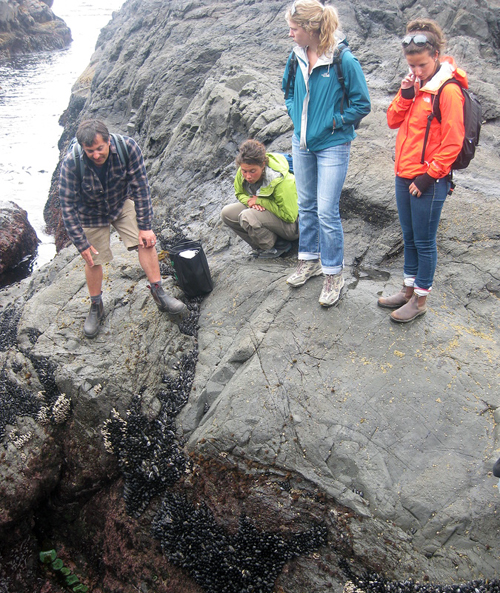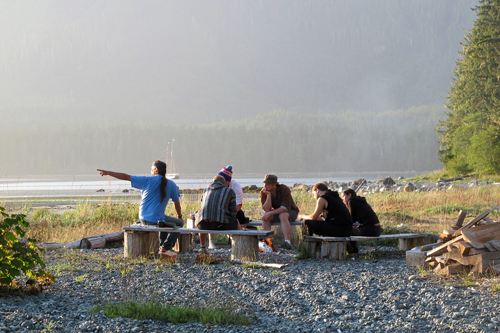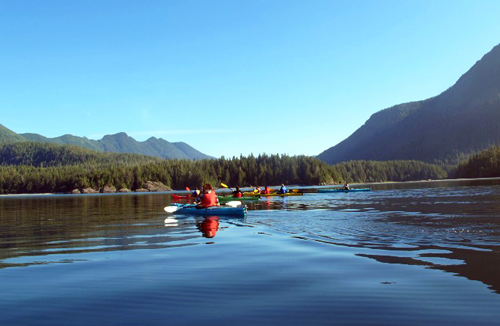By Prof. Stefan Linquist
Reprinted with permission from the author and the Philosophy of Science in Practice Newsletter No. 5, 2014.

The idea for a philosophy field course was born partly out of my dissatisfaction with standard approaches to environmental philosophy. I should mention that I am trained as a philosopher of science. Being asked by my department chair to teach courses in environmental philosophy involved broaching a new discipline. Problems arose right away in my search for suitable readings. Most of the topics consuming environmental philosophers in recent decades are, shall we say, a hard sell on my campus. Guelph deserves its reputation for activism. Students are busy campaigning against the sale of bottled water. They are attuned to the social disadvantages of suburban sprawl. Questions about whether trees have natural rights or whether nature has intrinsic value are far removed from their concerns, not to mention mine.
For several years I have been involved in the creation of an environmental education center – an aquarium, basically – on Vancouver Island’s remote west coast. In the 1990s this area hosted Canada’s largest act of civil disobedience: protests against old-growth logging. Today it remains a hothouse for environmental conflict.
In my capacity as “aquarium philosopher,” I encounter various opposing stakeholders. I have debated environmental policy with commercial fishermen and loggers. I’ve talked philosophy of science with environmentalists. I’ve learned about some of the challenges facing First Nations community leaders and their Western political counterparts. These are the kinds of conversations, I found myself thinking, that students of environmental philosophy should be having.
At first, the idea of a field course in philosophy sounds vaguely Pythonesque. My friends imagine us futzing with our togas as we cross puddles in search of the beer garden. As a matter of fact, what we do is entirely in keeping with the Socratic spirit. Many experts these days profess knowledge about environmental issues. Our role as field philosophers is to critically engage them.
The field component of the course takes place over twelve days in late August. By this point students have spent weeks reading about the area, to the point where they can formulate an informed research question. On each day we meet for two to five hours with representatives of at least one stakeholder group. In previous years, we have visited two fish farms and spoken at length with their operators. We have met with the managers of a First Nations-owned logging company – and then went whale watching with one of them, on his boat. We have spent several days making ourselves at home on Hesquiaht First Nation’s territory, where our time is punctuated by enlightening conversation with our hosts. We have met with several environmental groups, the local mayor, environmental consultants, eNGO representatives, and a host of other stakeholders. Throw in a little hiking or surfing, and the 12 days go by quickly.

Students arrive home exhausted and, dare I say, transformed. We then take the fall semester to reflect on our experiences while students develop individual research papers. It is a demanding teaching and learning experience that probably couldn’t work with more than 12 students. To call it rewarding is an understatement. Most of all, for me as well as the students, it has been a roller coaster of surprises.
The first thing you realize is that local stakeholder positions are as sophisticated as they are dynamic. Stakeholder groups are in constant engagement with one another. This generates a kind of arms race in which arguments are continually being developed, presented and rebutted. Each group is sharpening the latest barb, or polishing the most recent fact, to be used in debate against its perceived opponent.
In fact, our presence has an impact on the debate itself, to the point where our group serves as a conduit for informing other stakeholders about what each group is thinking. This dynamic situation stands in remarkably stark contrast to the relatively plodding pace of debates in an academic setting.
I was also surprised at how unprepared we were for the task. You start to realize right way just how different philosophical discussion can be when it is not based on a specific text. To understand a person’s position you need to develop penetrating questions, on the fly, usually while listening to what they are saying. I find that philosophy students possess transferrable skills for this task. They eventually get good at it. But there is invariably a learning curve as they transition from the primarily written to the almost exclusively spoken modality.
It is thus extremely valuable to end each session with an extensive debriefing. This usually involves a play-by-play of the conversation and a more careful reconstruction of the position that we have encountered. During these debriefings, usually one to two hours, students are often making sense of what they’ve heard in light of their individual research interests. Individual topics are essential for providing a filter against the barrage of potential topics and ideas that can easily overwhelm.
Perhaps the most palpable difference between classroom and field-course learning surrounds the emotional intensity with which ideas are presented. Stakeholders are naturally passionate about their respective causes. In conversation it is almost impossible not to empathize to some degree.
We are presumably all familiar with the experience where some intellectual opponent turns out to be more understandable in person than you would have guessed on paper. Now imagine engaging with a series of such individuals over just a few days, each one inviting you to share a slightly different stance. Students are surprised to find themselves agreeing on one day with a position that they rallied in opposition to the day before. This naturally inspires self reflection. Students often describe a kind of miniature crisis in belief, which I think is the perfect starting point for philosophical investigation. Now I am sure that many of us have enjoyed such transformative experiences inside the four walls of a classroom. Perhaps this is precisely why you became interested in academia in the first place. The observation that I want to share, as a primarily classroom-based learner and educator, is that these transformative experiences are generated more reliably and easily in the field.
Initially I had some concerns about the quality of students’ research projects. If they were grounding their studies on philosophical debates in the field, wouldn’t their work be of lesser quality than material based on canonical publications? I now think that field-course projects are no less rigorous but are often slightly different than what typically emerges in the classroom.
For example, much of the debate between fish farmers and environmentalists hinges on the familiar fact/value distinction. But as one of my students observed, both sides look at the same issue and disagree about whether it is a matter fact or a matter of value. Take the issue of fish farm effluent. If you can characterize it as an entirely scientific question whether effluent is locally damaging, then it is a straightforward issue as to how its effects might be mitigated. Effectively, the game is over and fish farms win. But if effluent can be portrayed as an ethical issue, as a reflection of carelessness and bad character, then there is no easy out for the fish farm. It is no surprise that environmentalists tend to steer the debate in an ethical direction while their opponents do the opposite.
A typical research question then becomes how to decide which discourse is most appropriate for a given topic. Is there perhaps an ideal partitioning of the relevant facts and values that both sides might agree to?
I’ll leave it to others to judge whether field-course projects are more or less rigorous – or whether this matters. The one thing that no one can deny is their relevance. Students recognize immediately that their projects have significance for the way that people lead their lives.
As a form of feedback to our stakeholders, I encourage students to summarize their findings on a blog, which is read by members of the community that we visit. My sense is that these worldly ties, specifically to people outside the university setting, lends a degree of authenticity to students’ projects that they find highly motivating.
I’d like to close with a reflection on teaching in the humanities, philosophy in particular. Over the past few years, I have become increasingly troubled by the perceived irrelevance of what we do. To outsiders, the idea of philosophy having practical relevance serves as good comedic source material. Perhaps this is a tolerable cross to bear, but even within the discipline, many of our own students graduate thinking that they lack practical skills. They view themselves as narrow experts on idiosyncratic topics that almost no one cares about.
It takes time and experience to see that those same analytical skills are immensely powerful tools, applicable in innumerable contexts. Perhaps this is the greatest advantage to students who spend 12 days debating ideas with stakeholders in the field. They come to see that their training is useful outside the classroom.
